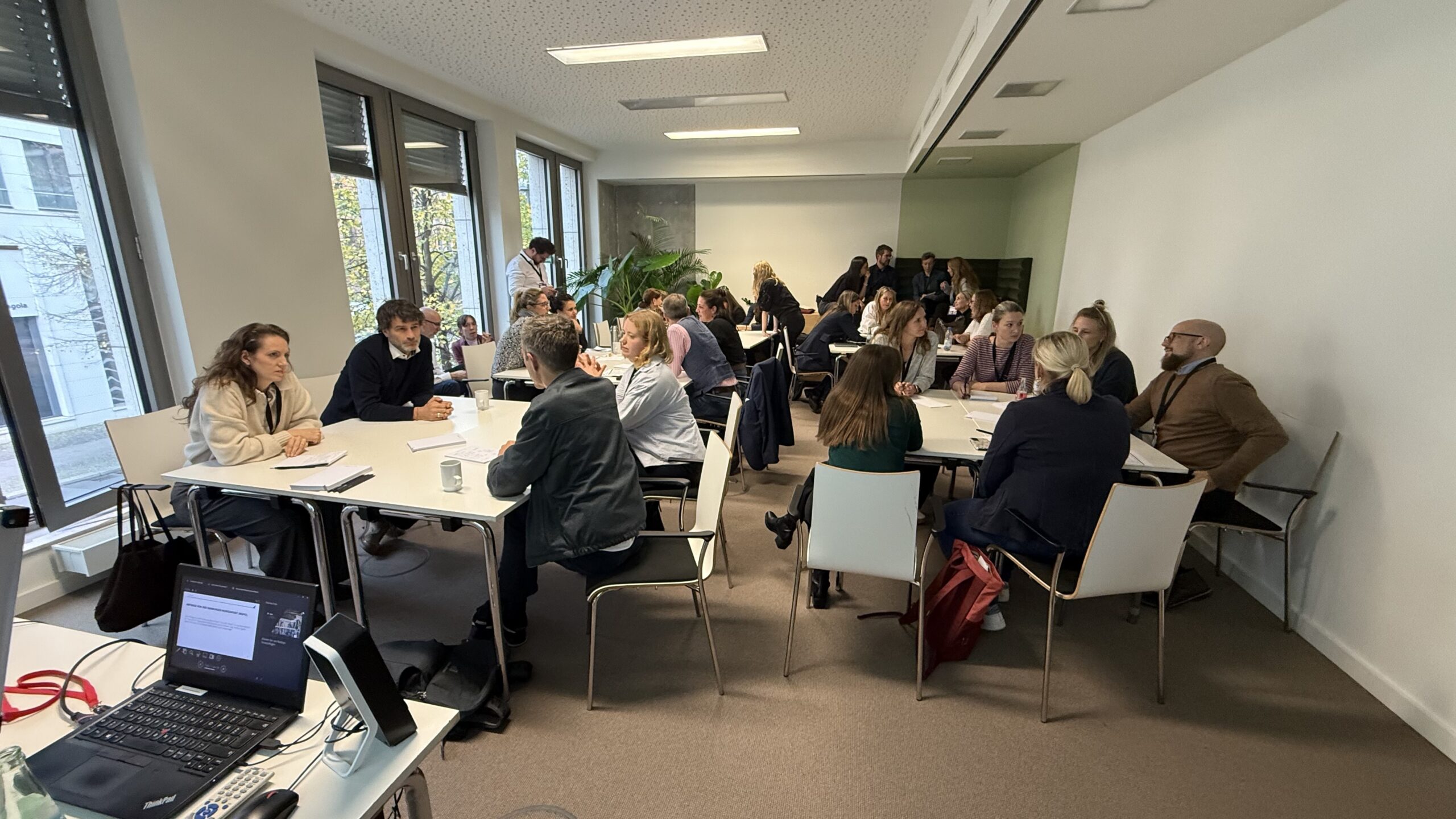
20.02.25
Anna is sitting in her office on Friedrichstrasse in Berlin. Normally, the city never sleeps. But today the energy feels different. It's Monday, the first working day after the parliamentary elections, and although the sun is shining brightly, there is a heavy feeling in the air. The AfD has won the election. A coalition with the CDU is now within reach.
Yesterday, Anna spent the moment with her friends in front of the TV, hands clutching a glass of wine as the results flickered across the screens. At first it was a fear, then certainty. “This is not a nightmare,” she thought, “it is now reality.” And with the outcome of the election, which puts Germany on a clearly right-wing course, her life as a communications consultant has changed irrevocably.
A new tone in society
On her way to work, Anna notices it everywhere. People seem to be holding their breath. Conversations on the subway are quieter, more nervous. No small talk, no loud phone calls or music, just a general feeling of insecurity. What happens next? What can we expect? Posters from the election are still hanging on the walls – AfD slogans torn from their original context: “Courage for the truth” and “Germany first”. Before, she had only smiled at these posters – how could anyone think like that, she had always wondered – now they seem almost threatening.
When she arrives at the office, there is a tense bustle. Her colleagues speak in hushed tones. It's hard to grasp what it all means. What will this new government mean for the economy, for society, and for her job? No one really knows how to prepare customers, employees, and other stakeholders for an unpredictable time that is further fueling drastic global movements.
The uncertainty
The phone starts ringing early in the morning. A multinational company in the chemical industry is the first to get in touch. One of Anna's long-standing clients, a global market leader based in Frankfurt. Over the past few years, the corporate communications team and Anna have laboriously spent time setting the focus of communication in line with the corporate strategy on sustainability. But now this very topic seems to be their Achilles' heel. The head of corporate communications is visibly unsettled. “Our customers abroad are already asking how we intend to remain in a country that is creating new investment risks with this policy,” he said. “And what will happen to the subsidies we depend on? We were counting on the expansion of infrastructure for hydrogen and renewable energies!” This is no longer just about putting out fires; the acceptance and continued existence of their location is fundamentally in question.
Later that day, a large construction company gets in touch. You would have thought that they would benefit from the new government's relaxation of environmental regulations and labor laws. But it wasn't that simple. They fear being branded as profiteers of a system that doesn't align with the value systems of their international partners and investors. “We can't afford bad headlines, we need the public contracts,” says the CEO. “But if we keep our feet still, our domestic audience will brand us as hesitant – and who wants to work for a right-wing employer? How do we position ourselves?”
Perhaps the most poignant conversation Anna has that day is with a hospital network she supports. The CEOs were horrified because the new government had already signaled that it would restrict immigration in the healthcare system and integration projects. What should they say to the international doctors on whom they depend? What about their nursing staff without German citizenship? How do they explain to patients that they will now have to wait even longer for treatment? It is not only a moral dilemma, but also an economic one, from which there is no easy way out.
A new order
During her breaks, Anna does what she always does and does best: reading the news, analyzing moods, absorbing the world's reactions. The headlines from Washington in recent weeks have not been easy to digest. Trump, who with his re-election is once again driving the US towards isolationism and nationalism after a four-year liberal break, praises the “German spirit and national pride” of the new government. In Poland and Hungary, the German election result is inspiring national conservative movements. It is not only Germany that is being driven into a corner – it is an entire world order that is slowly falling apart.
“How can this be my new normal?” thought Anna, ”This is going to be more difficult than I thought.”
How can she help her customers through this time? How can she communicate neutrally when the mood itself no longer allows for neutrality?
Who will lead the dialog?
As Anna leaves the office late at night, she reflects on the day. The first after the dawn of a new chapter in the history of the Federal Republic of Germany. The fear of her customers. The question of where Germany will stand tomorrow. The responsibility that rests on her shoulders because she has to help set the tone for the dialogue between companies, society and a fragmented public. She knows very well that this is just the beginning. The pressure to communicate in a differentiated, clever and, above all, prudent manner is now greater than ever.
“It shouldn't have come to this,” Anna mutters softly to herself as she walks to the subway. And she was right. An AfD election victory may still sound unrealistic to many, but the world has changed. We all have a responsibility to prevent this from happening before it becomes our reality.
Maybe that's what's important, Anna thinks as she unlocks the door to her apartment: telling stories. Shaking others out of their complacency, making them think about how radical changes are possible even in stable democracies – and what that means for us as communication professionals, but also as citizens.
Because one thing is clear: an election result is not just a political event. It changes the way we talk, work and interact with each other. And if we don't start the dialogue in time, there will be others who will do it for us.

20.02.25
Anna is sitting in her office on Friedrichstrasse in Berlin. Normally, the city never sleeps. But today the energy feels different. It's Monday, the first working day after the parliamentary elections, and although the sun is shining brightly, there is a heavy feeling in the air. The AfD has won the election. A coalition with the CDU is now within reach.
Yesterday, Anna spent the moment with her friends in front of the TV, hands clutching a glass of wine as the results flickered across the screens. At first it was a fear, then certainty. “This is not a nightmare,” she thought, “it is now reality.” And with the outcome of the election, which puts Germany on a clearly right-wing course, her life as a communications consultant has changed irrevocably.
A new tone in society
On her way to work, Anna notices it everywhere. People seem to be holding their breath. Conversations on the subway are quieter, more nervous. No small talk, no loud phone calls or music, just a general feeling of insecurity. What happens next? What can we expect? Posters from the election are still hanging on the walls – AfD slogans torn from their original context: “Courage for the truth” and “Germany first”. Before, she had only smiled at these posters – how could anyone think like that, she had always wondered – now they seem almost threatening.
When she arrives at the office, there is a tense bustle. Her colleagues speak in hushed tones. It's hard to grasp what it all means. What will this new government mean for the economy, for society, and for her job? No one really knows how to prepare customers, employees, and other stakeholders for an unpredictable time that is further fueling drastic global movements.
The uncertainty
The phone starts ringing early in the morning. A multinational company in the chemical industry is the first to get in touch. One of Anna's long-standing clients, a global market leader based in Frankfurt. Over the past few years, the corporate communications team and Anna have laboriously spent time setting the focus of communication in line with the corporate strategy on sustainability. But now this very topic seems to be their Achilles' heel. The head of corporate communications is visibly unsettled. “Our customers abroad are already asking how we intend to remain in a country that is creating new investment risks with this policy,” he said. “And what will happen to the subsidies we depend on? We were counting on the expansion of infrastructure for hydrogen and renewable energies!” This is no longer just about putting out fires; the acceptance and continued existence of their location is fundamentally in question.
Later that day, a large construction company gets in touch. You would have thought that they would benefit from the new government's relaxation of environmental regulations and labor laws. But it wasn't that simple. They fear being branded as profiteers of a system that doesn't align with the value systems of their international partners and investors. “We can't afford bad headlines, we need the public contracts,” says the CEO. “But if we keep our feet still, our domestic audience will brand us as hesitant – and who wants to work for a right-wing employer? How do we position ourselves?”
Perhaps the most poignant conversation Anna has that day is with a hospital network she supports. The CEOs were horrified because the new government had already signaled that it would restrict immigration in the healthcare system and integration projects. What should they say to the international doctors on whom they depend? What about their nursing staff without German citizenship? How do they explain to patients that they will now have to wait even longer for treatment? It is not only a moral dilemma, but also an economic one, from which there is no easy way out.
A new order
During her breaks, Anna does what she always does and does best: reading the news, analyzing moods, absorbing the world's reactions. The headlines from Washington in recent weeks have not been easy to digest. Trump, who with his re-election is once again driving the US towards isolationism and nationalism after a four-year liberal break, praises the “German spirit and national pride” of the new government. In Poland and Hungary, the German election result is inspiring national conservative movements. It is not only Germany that is being driven into a corner – it is an entire world order that is slowly falling apart.
“How can this be my new normal?” thought Anna, ”This is going to be more difficult than I thought.”
How can she help her customers through this time? How can she communicate neutrally when the mood itself no longer allows for neutrality?
Who will lead the dialog?
As Anna leaves the office late at night, she reflects on the day. The first after the dawn of a new chapter in the history of the Federal Republic of Germany. The fear of her customers. The question of where Germany will stand tomorrow. The responsibility that rests on her shoulders because she has to help set the tone for the dialogue between companies, society and a fragmented public. She knows very well that this is just the beginning. The pressure to communicate in a differentiated, clever and, above all, prudent manner is now greater than ever.
“It shouldn't have come to this,” Anna mutters softly to herself as she walks to the subway. And she was right. An AfD election victory may still sound unrealistic to many, but the world has changed. We all have a responsibility to prevent this from happening before it becomes our reality.
Maybe that's what's important, Anna thinks as she unlocks the door to her apartment: telling stories. Shaking others out of their complacency, making them think about how radical changes are possible even in stable democracies – and what that means for us as communication professionals, but also as citizens.
Because one thing is clear: an election result is not just a political event. It changes the way we talk, work and interact with each other. And if we don't start the dialogue in time, there will be others who will do it for us.



